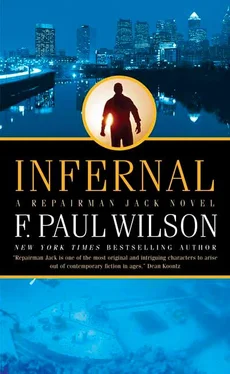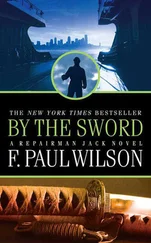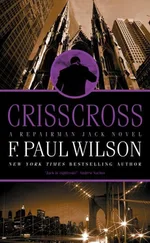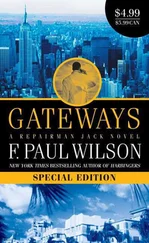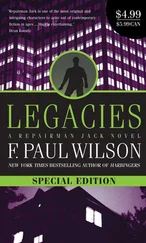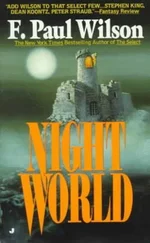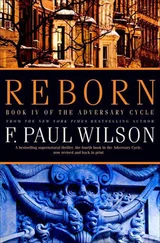F. Paul Wilson - Infernal
Здесь есть возможность читать онлайн «F. Paul Wilson - Infernal» весь текст электронной книги совершенно бесплатно (целиком полную версию без сокращений). В некоторых случаях можно слушать аудио, скачать через торрент в формате fb2 и присутствует краткое содержание. Жанр: Ужасы и Мистика, на английском языке. Описание произведения, (предисловие) а так же отзывы посетителей доступны на портале библиотеки ЛибКат.
- Название:Infernal
- Автор:
- Жанр:
- Год:неизвестен
- ISBN:нет данных
- Рейтинг книги:3 / 5. Голосов: 1
-
Избранное:Добавить в избранное
- Отзывы:
-
Ваша оценка:
- 60
- 1
- 2
- 3
- 4
- 5
Infernal: краткое содержание, описание и аннотация
Предлагаем к чтению аннотацию, описание, краткое содержание или предисловие (зависит от того, что написал сам автор книги «Infernal»). Если вы не нашли необходимую информацию о книге — напишите в комментариях, мы постараемся отыскать её.
Infernal — читать онлайн бесплатно полную книгу (весь текст) целиком
Ниже представлен текст книги, разбитый по страницам. Система сохранения места последней прочитанной страницы, позволяет с удобством читать онлайн бесплатно книгу «Infernal», без необходимости каждый раз заново искать на чём Вы остановились. Поставьте закладку, и сможете в любой момент перейти на страницу, на которой закончили чтение.
Интервал:
Закладка:
Saying a prayer that he'd be successful in his deception, he strode up the gangway.
As he stepped upon the deck he looked around for a familiar face. He spotted an older man in his forties—perhaps ten years older than he—with a stubbly beard and a mild limp moving toward him. Francisco was startled to recognize Eusebio Dominguez. He looked so different with a beard.
They'd met a week ago. Eusebio had been sent by the Vatican and was to be their man among the crew. Francisco knew nothing about him other than the fact that he had been a seaman in his younger days. As for his present circumstances, for all Francisco knew he could be a cardinal or a chimney sweep.
Francisco was glad he had not been assigned the role of a sailor. He was too slight of build to pass for one. His neat black clothes, his shaven cheeks, and long black hair better suited him to the role of navigator.
As arranged, Eusebio gave no sign of recognition. Instead, he made a show of a smirk and a surly tone as he eyed Francisco's Valencian clothing.
"What do you want?"
"To see your captain."
"Do you? And who shall I say is calling?"
"Your navigator."
The smirk turned into a grin. "You are on the wrong ship, sefior. Sergio Vazquez is our navigator." He shrugged. "Of course he has been ill—"
"Senor Vazquez died in his sleep in Compano last night. I have been sent by the ship's owner to replace him."
Now the smirk disappeared. "Vazquez… dead?"
Nearby, two seamen paused in their labors and looked up, echoing Eusebio.
Francisco feigned losing patience. "The captain?"
"He is ashore but he will be back soon. You can wait outside his cabin."
He followed Eusebio up the steps to the aftcastle.
"Here," Eusebio said, pointing to a spot in front of the door to the officers' quarters. Then he wagged his finger. "Not inside."
"Very well."
"As soon as he gets back I will tell him you are here."
Francisco nodded and placed his belongings on the deck: a cloth sack with his clothes and personal items, a mahogany box containing his astrolabe—which he would not need until they were out of sight of the coast—and his oilcloth-wrapped portolano.
He gazed out over the main deck, bustling in the dawn. Three masts, naked now, but soon to be rigged square and lateen. But what lay belowdecks interested him more: a secret nestled among the cargo bound for the New World.
It was that secret that had brought him here.
It had to do, in a way, with King Philip, old and sick and not long for this world. Perhaps it was the humiliation of three failed attempts to invade England, the most recent just last year when the third Armada was turned back by heavy seas. Philip ruled the most powerful nation in the world, yet his heavy taxation threatened Spanish hegemony; he would be leaving his successor an empire in crisis.
Perhaps Spain's day had passed. The thought saddened Francisco. He had sailed in her navy as a younger man, and had piloted the Santa Clarita in the first Armada. Could it have been only a decade ago? It seemed like a lifetime.
His small galleon, the Santa Clarita , had escaped Drake's fireboats but had been driven north with the rest of the fleet. Francisco had guided the ship through the stormy Orkney isles north of Scotland and back to Lisbon. His ship was one of only sixty-seven out of the one hundred and thirty of the original fleet.
Despite his failings, Philip remained favored by the Vatican as a loyal member of the Catholic League in the wars against the Huguenots, and as a staunch defender of the faith against the rising Calvinist threat.
This was why the Church was maintaining the utmost discretion as it dealt with the theft of a valuable relic from its proscribed vault deep below the Vatican. The cardinals still did not know how the thief had eluded detection by the Swiss Guard and gained access to the vault, but there was no doubt about his identity: Don Carlos of Navarre, King Philip's beloved nephew.
Six weeks ago his Holiness Pope Clement VIII had summoned Father Claude Aquaviva to the Holy See. There, behind the locked doors of the innermost sanctum of the Vatican, the Father General of the Society was charged with the retrieval and disposal of the purloined relic, with no harm to Don Carlos in the process, and no connection to the Vatican. In fact, if the object's loss appeared to be an act of God rather than man, so much the better.
Francisco found it astounding that an honor of this magnitude would be bestowed upon such a young order. A former soldier named Ignatius Loyola had founded the Society of Jesus fewer than six decades ago, but since its inception it had proved a magnet for some of the best minds in the civilized world.
That Francisco, a yet-to-be-ordained Jesuit brother, should be chosen for the mission… well, it seemed beyond belief.
Could it be but three weeks since Father Diego Vega, the Father General's second in command, had stepped into his quarters, closed the door, and told him what he must do?
Francisco understood that he had been chosen because of his nautical past and his interest in astronomy. And of course, because of his devotion to the Society.
His head was still spinning. He had spent the last three years in Greece studying their ancient texts on the stars, and had only recently returned. He was still recovering from the disorienting experience of seeming to lose ten days of his life because of Greece's refusal to give up the Julian calendar. Spain had been utilizing Pope Gregory's new calendar for decades.
And now this.
The world was changing too fast. Ah, but the stars… one could always count on the stars.
He had joined the King's Navy at a young age and learned navigation by trial and error. Before too long he was assisting the pilot, honing his skills as he sailed the length and breadth of the Mediterranean, staying mostly within sight of shore as did most navigators, but unafraid to leave the comfort of land on the horizon and strike out into open water.
Not a terrible risk in the Mediterranean. If one set sail from its African shore and held to a northerly course, soon enough one would spy Europe.
But the Atlantic… now that was a different matter. The swells, the storms, the space between its shores. Not a place for the faint of heart.
Francisco remembered the first time he had piloted a galleon through the Straits of Gibraltar and into the Atlantic. The captain had wanted to test the seaworthiness of his vessel as well as Francisco's skills. They traveled west-northwest for two days, then south for one, and then the captain told him to guide them back to where they had begun.
Using his astrolabe and cross staff, Francisco piloted the ship with such accuracy that their first sight of land was the high cliffs of Gibraltar.
He would have had a future in the navy, but instead he obeyed a higher calling.
He looked now again at the main deck of the Sombra . Originally christened Santa Ines , it had served Spain until last year when the navy sold it. Francisco was no expert on naval policy, but he wondered how often a navy sold off one of its ships. Another sign of an atrophying empire? He might understand if the Santa Ines was old and decommissioned, but this nao was in excellent condition.
Even considering King Philip's financial troubles, selling it seemed unusual. So unusual that one would have to assume the buyer to be a most influential man. Like Don Carlos of Navarre, perhaps.
But why had the new owner changed the ship's name from something holy to something unquestionably dark—from a saint to a shadow? Why would anyone choose such a name for a ship?
And why would it be sailing without escort through waters infested with pirates and British privateers?
Читать дальшеИнтервал:
Закладка:
Похожие книги на «Infernal»
Представляем Вашему вниманию похожие книги на «Infernal» списком для выбора. Мы отобрали схожую по названию и смыслу литературу в надежде предоставить читателям больше вариантов отыскать новые, интересные, ещё непрочитанные произведения.
Обсуждение, отзывы о книге «Infernal» и просто собственные мнения читателей. Оставьте ваши комментарии, напишите, что Вы думаете о произведении, его смысле или главных героях. Укажите что конкретно понравилось, а что нет, и почему Вы так считаете.
